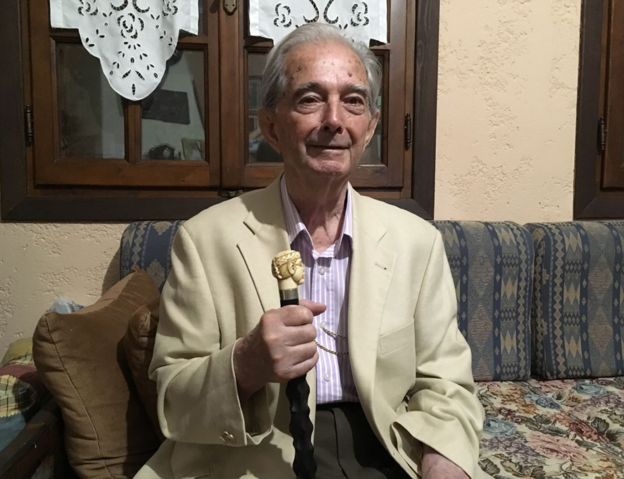BBC ran a lengthy report on the Macedonian community in Greece, and how it has survived decades of attempts at force assimilation and expulsions. The report by Maria Margaronis refers to Macedonians as Macedonian Slavs and describes the persecution down to details about the modes of torture used on Macedonians by the successive Greek regimes, executions and an all-present surveillance apparatus put in place to stop remaining Macedonians from speaking in their native language.
Greece occupied the region referred to by Macedonians as Aegean Macedonia barely a 100 years ago, in 1912, and it was only made majority Greek in 1921, when Greece and Turkey performed a major population transfer, and the newly arrived Greek population from Turkey was settled in Macedonia.
The report presents the life story of a 92 year old Macedonian man identified as Mr. fokas,
As Mr Fokas’s uncle used to say, the family was “neither Serb, nor Greek, nor Bulgarian, but Macedonian Orthodox”. Mr Fokas remembers policemen eavesdropping on mourners at funerals and listening at windows to catch anyone speaking or singing in the forbidden tongue. There were lawsuits, threats and beatings. Women – who often spoke no Greek – would cover their mouths with their headscarves to muffle their speech, but Mr Fokas’s mother was arrested and fined 250 drachmas, a big sum back then, BBC reports.
He describes how the names of the towns and villages were changed by the Greek Government in the 1920-ies, to reflect their new Greek identity, and how the oppression and forced assimilation against Macedonians began in earnest during the Metaxas dictatorship in 1936.
Slavic-speakers suffered a lot from the Greeks under Metaxas,” he says. “Twenty people from this village, the heads of the big families, were exiled to the island of Chios. My father-in-law was one of them.” They were tortured by being forced to drink castor oil, a powerful laxative, Fokas relates.
Another wave of repression followed after the Greek Civil War, when Macedonians in the region took the Communist side as it promised an end to the forced assimilation. Their forces were defeated at the end of the three year long war, in large part owing to an intervention from the United Kingdom.
When the Communists were finally defeated, severe reprisals followed for anyone associated with the resistance or the left. “Macedonians paid more than anyone for the civil war,” Mr Fokas says. “Eight people were court-martialled and executed from this village, eight from the next village, 23 from the one opposite. They killed a grandfather and his grandson, just 18 years old.”, BBC reports, describing the traumatic evacuation of Macedonian and Greek communist children from Aegean Macedonia, many of whom were taken to far away Warsaw bloc countries, some as far as Uzbekistan.
BBC presents works of Greek historians who estimate that more than 100.000 Macedonians still live in now-days northern Greece, although only 10 to 20 thousand would openly identify as Macedonians after the lengthy repression they suffered.
https://www.bbc.com/news/stories-47258809




Comments are closed for this post.